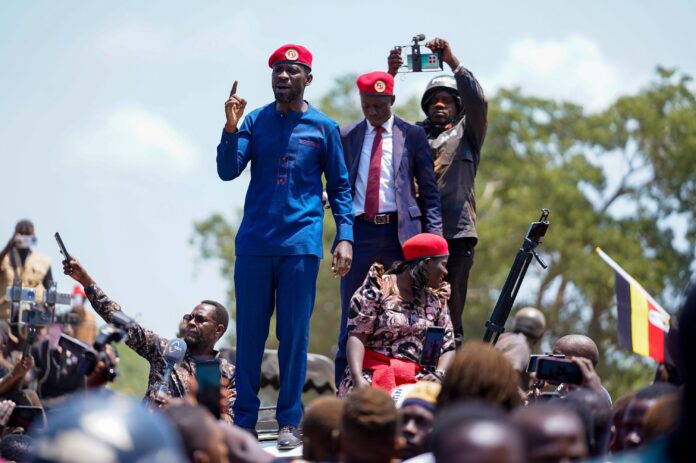The National Unity Platform (NUP) and its leader, Robert Kyagulanyi Ssentamu, popularly known as Bobi Wine, completed a highly contested mobilization tour of Kamuli and Buyende districts, claiming victory despite facing extensive police blockades and road closures designed to thwart their movement.
NUP officials asserted that authorities’ attempts to force them off major thoroughfares and onto remote, dusty alternative roads inadvertently played into their strategy, allowing them to connect directly with their core rural base.
The Kamuli and Buyende tour on 30th September, 2025, was characterized by standoffs and forced detours, particularly frustrating NUP’s attempts to reach planned destinations such as Bukungu landing site.
Blockades and ‘Eating Dust’
According to statements released by the party leadership, police deployments aggressively blocked main roads, compelling the NUP convoy to navigate challenging, unpaved routes.
David Lewis Rubongoya, the NUP Secretary General, detailed the logistical struggles faced by the team, emphasizing the poor state of the alternative roads and the deliberate attempts to extend their travel time.
“Today has been a day of eating so much dust because of the terrible roads. It’s been a day of enduring long distances because the main roads were blocked,” Rubongoya stated on social media, confirming that the convoy was prevented from reaching Bukungu Island.
However, the party quickly framed the harassment as a strategic miscalculation by the state.
Rural Audience is the ‘Actual Target’
The NUP leadership argued that the security forces, by pushing them away from urban centers, were essentially delivering them straight to the constituents they most needed to reach.
A statement from the NUP central leadership highlighted this counter-narrative of resilience and strategic advantage.
“They did all they could to block us from passing through the main streets of town centers and forced us to use alternative rural dusty routes. Little did they know that the rural audience is our actual target,” the statement read, suggesting that state interference merely enhanced their access to grassroots voters.
Bobi Wine confirmed that despite the intense operational challenges, including the inability to reach Bukungu, they successfully addressed massive crowds in Buyende Town Council and across Kamuli District.
“Despite a police blockade which prevented us from reaching our planned destination… and the deliberate blocking of main roads, we still addressed our people in Buyende Town Council and Kamuli District,” Bobi Wine posted, echoing the defiance of his party.
Assertion of People Power
For the NUP, the highly publicized tour served as a testament to the enduring loyalty of their supporters, even when faced with intimidation and logistical hurdles. Both Bobi Wine and Rubongoya stressed that the massive turnout overwhelmed the attempts at suppression.
Rubongoya concluded his address to the supporters by thanking the crowds for their steadfast appearance: “but it was also a day of people showing up in very large numbers to assert their power. Thank you Kamuli and Buyende.”
Bobi Wine summarized the day’s events as proof that their movement’s popularity transcends state repression. “People Power is stronger than the people in power!” he declared. The repeated confrontation between the NUP mobilization efforts and state security forces remains a defining feature of Uganda’s political landscape as the country prepares for future electoral cycles.



